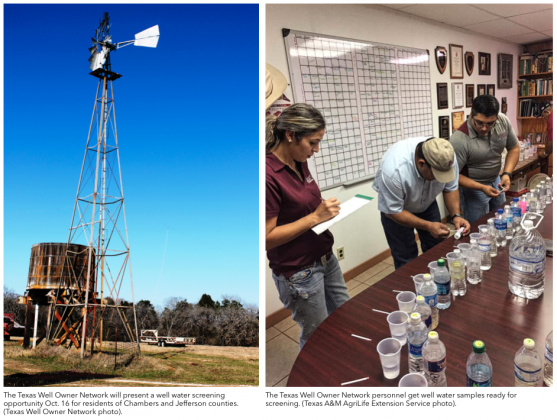Private water well screen Oct. 16 in Chambers and Jefferson counties
The Texas Well Owner Network is hosting free water well screenings in Chambers and Jefferson counties to give area residents whose water wells flooded from the recent rains the opportunity to have their water screened.
The screenings will be free of charge from 8:30-10 a.m. Oct. 16 at the following locations:
– Texas A&M AgriLife Extension Service office for Chambers County, 295 White Memorial Park Road in Anahuac.
– AgriLife Extension office for Jefferson County, 1225 Pearl St., Suite 200 in Beaumont.
– Chambers County Commissioner Precinct 1 office, 211 Broadway Ave., in Winnie.
– Jefferson County Justice of the Peace Precinct 4 office, 19217 Farm-to-Market 365 in Beaumont.
A follow-up meeting explaining results for all screenings will be at 5:30 p.m. Oct. 17 at the J.P. Precinct 1 Courtroom, 211 Broadway Ave. in Winnie.
The samples must be turned in by 10 a.m. on the day of the screening. Sampling bags and bottles can be obtained from the AgriLife Extension office in Chambers or Jefferson counties, and all instructions for proper sampling should be followed to ensure accurate results.
Diane Boellstorff, Ph.D., AgriLife Extension water resource specialist, College Station, said private water well owners whose wells flooded should assume their well water is contaminated until screened.
“You should not use water from a flooded well for drinking, cooking, making ice, or brushing your teeth until you are satisfied it is not contaminated,” Boellstorff said.
Boellstorff, with Texas A&M University’s Department of Soil and Crop Sciences, said floodwater may contain substances from upstream, such as manure, sewage from flooded septic systems or wastewater treatment plants or other contaminants.
She also noted a septic system near a well also can cause contamination when the soil is flooded.
Joel Pigg, AgriLife Extension program specialist, College Station, said samples will be screened for contaminants including total coliform bacteria, E. coli, nitrate-nitrogen and salinity.
Pigg said research shows the presence of E. coli bacteria in water indicates that waste from humans or warm-blooded animals may have contaminated the water. Water contaminated with E. coli is more likely to also have pathogens present that can cause diarrhea, cramps, nausea or other symptoms.
“Water with nitrate-nitrogen at levels of 10 parts per million is considered unsafe for human consumption,” Pigg said. “These nitrate levels above 10 parts per million can disrupt the ability of blood to carry oxygen throughout the body, resulting in a condition called methemoglobinemia. Infants less than 6 months of age and young livestock are most susceptible.”
Salinity, as measured by total dissolved solids, will also be determined for each sample, he said. Water with high levels may leave deposits and have a salty taste, and using water with high levels for irrigation may damage soil or plants.
Pigg said it is extremely important for those submitting samples to be at the Oct. 17 meeting to receive results, learn corrective measures for identified problems and improve their understanding of private well management.
After a flood, he said, wells should be inspected for physical damage and signs of leakage. If it appears damaged, consult a licensed water well contractor to determine whether repairs are needed. He also noted flooding can damage the well pump and electrical systems.
“If the pump and/or electrical system has been underwater and it is not designed to be underwater, do not turn on the pump as there is a potential for electrical shock or damage to your well or pump,” he said.
Pigg said once floodwaters have receded and pump and electrical system have dried, have a qualified electrician, well driller or pump installer check the wiring system and other well components.
For more information, please contact the AgriLife Extension office in Chambers County at 409-374-2123 or Jefferson County at 409-835-8461. To learn more about the programs offered through the network or to find additional publications and resources, please visit TWON’s website.
Funding for the Texas Well Owner Network is through a Clean Water Act nonpoint source grant provided by the Texas State Soil and Water Conservation Board and the U.S. Environmental Protection Agency. The project is managed by TWRI, part of Texas A&M AgriLife Research, AgriLife Extension and the College of Agriculture and Life Sciences at Texas A&M University.
Buy a 1-year subscription to THE VINDICATOR from a Liberty Panther between Sept. 16 and Oct. 11 and half of the purchase price will go to the Liberty Athletic Booster Club for the benefit of your Liberty Panthers.

